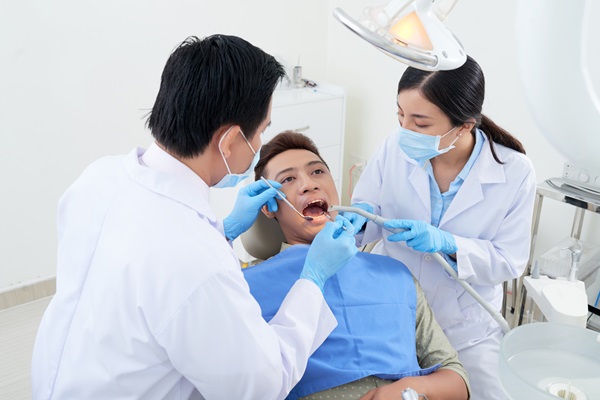One aspect often overlooked in the quest for holistic well-being is oral health. In this comprehensive guide, we will delve into the profound interconnection between dental care and overall health. From the anatomy of the oral cavity to emerging technologies, we will explore the importance of oral health as well.

Introduction
When it comes to health, the significance of comprehensive dental care cannot be overstated. A healthy mouth is not just about a beautiful smile but is intricately linked to one’s overall well-being. This guide will navigate through the complex landscape of oral health and its impact on your life.
The importance of oral health
Oral health goes beyond bright teeth; it is a gateway to a healthy body and mind. Neglecting it can lead to various oral diseases, such as cavities, gum disease, and bad breath. But the consequences extend far beyond the mouth. Poor oral health can contribute to systemic health issues, including cardiovascular diseases, diabetes, and respiratory problems. This interconnectedness highlights the critical need for comprehensive dental care.
The link between Oral Health and Overall Well-being
The mouth is a mirror of your body’s health. The bacteria and inflammation in your mouth can spread throughout your body, impacting various systems and organs. For example, the inflammation associated with gum disease has been linked to an increased risk of heart disease and stroke. Moreover, poor oral health can affect your self-esteem and mental well-being. A healthy, confident smile can boost self-esteem and positively impact your social and professional life.
The scope of comprehensive dental care
Comprehensive dental care encompasses a wide range of practices and approaches to ensure not only a beautiful smile but also optimal overall health. This includes preventive dentistry, advanced dental procedures, cosmetic dentistry, dental care for specific demographics, and more. Let’s explore each facet in depth.
The Anatomy of the Oral Cavity
Understanding the complex structure of your mouth is the first step towards appreciating its significance.
Teeth, gums, and supporting structures
The oral cavity comprises teeth, gums, supporting bones, and various soft tissues. Each of these components has a unique role in maintaining your oral health.
Teeth: These hard, mineralized structures are vital for biting and chewing. They come in different types, each serving a specific purpose in breaking down food.
Gums: The soft tissues that surround your teeth and support them. Healthy gums are essential to anchor teeth and protect them from infection.
Supporting Bones: The jawbones provide a foundation for your teeth. Maintaining bone health is crucial for the stability of your teeth.
How each component affects overall health
A healthy tooth is not an isolated entity; its condition can impact the rest of your body. For instance:
Teeth: Tooth decay and infection can lead to severe pain and systemic infections if left untreated. Proper dental care can prevent such complications.
Gums: Gum diseases like gingivitis and periodontitis can lead to inflammation, which is linked to various health problems, including heart disease and diabetes.
Supporting Bones: Jawbone health is vital, especially in procedures like dental implants, where a strong foundation is necessary for long-term success.
Oral Health and Systemic Diseases
The mouth-body connection goes far beyond what meets the eye.
The connection between oral health and heart disease
Surprisingly, your heart’s health can be influenced by your oral hygiene practices. Recent research suggests that the bacteria from gum disease can enter the bloodstream and cause inflammation in the arteries, increasing the risk of heart disease. Maintaining healthy gums and regular dental check-ups can help mitigate this risk.
Impact of oral hygiene on diabetes
Controlling blood sugar involves more than diet; oral hygiene is a key player. People with diabetes are more susceptible to gum disease, and gum disease can make diabetes harder to control. Proper oral care, including managing blood sugar levels, can significantly improve the quality of life for those with diabetes.
Dental health and respiratory diseases
Breathing easily is closely related to a clean and healthy oral cavity. Certain oral conditions, like gum infections, can lead to respiratory problems if bacteria are inhaled into the lungs. Proper oral hygiene can help prevent these complications, especially in individuals with compromised immune systems.
Preventive Dentistry
Prevention is the cornerstone of comprehensive dental care.
Regular dental check-ups
Early detection is the key to nipping dental issues in the bud. Regular dental check-ups are vital for identifying potential problems before they escalate. Your dentist can spot issues like cavities, gum disease, or oral cancer in their early stages, making them easier to treat and less costly to address.
Importance of oral hygiene and brushing techniques
Proper brushing techniques can be your first line of defense. Brushing your teeth at least twice a day, using fluoride toothpaste and a soft-bristle brush, helps remove food particles and plaque. Flossing is equally crucial for reaching areas your toothbrush can’t. These simple practices can prevent tooth decay, gum disease, and bad breath.
Dietary habits for healthy teeth
What you eat can either fortify or weaken your teeth; choose wisely. A balanced diet rich in calcium, vitamin D, and other essential nutrients is essential for strong teeth and gums. Avoid excessive consumption of sugary and acidic foods, which can erode tooth enamel and promote decay.
Advanced Dental Procedures
Advanced dental procedures have revolutionized oral health and, in turn, overall well-being. These techniques address various issues, from missing teeth to misalignment.
Dental implants and their role in overall health
Dental implants have become a game-changer for those with missing teeth. They not only restore your smile but also help preserve bone density, maintaining the integrity of your facial structure. This innovation doesn’t just improve aesthetics but enhances oral and overall health.
Orthodontic treatments and their impact on well-being
Orthodontic treatments like braces and clear aligners not only improve the appearance of your teeth but also correct misalignments that can cause bite problems, jaw pain, and even speech difficulties. By enhancing oral function, orthodontics plays a significant role in overall health.
Gum disease treatment and its health implications
Gum disease, if left untreated, can result in tooth loss and systemic health issues. Periodontal treatments not only preserve your smile but also reduce the risk of heart disease, stroke, and other health complications related to gum inflammation.

Cosmetic Dentistry and Self-Esteem
Aesthetic dentistry is more than vanity; it can boost your confidence and mental well-being.
Boosting confidence through aesthetic dentistry
Feeling good about your smile can significantly impact your self-esteem and how you present yourself in social and professional settings. Cosmetic dentistry, including teeth whitening, veneers, and smile makeovers, can boost your confidence and positively influence your life.
Psychological benefits of a great smile
A beautiful smile isn’t just about appearances; it can also affect your mental health. People with better smiles tend to be more optimistic, experience less stress, and have better social interactions. This psychological well-being contributes to overall health.
Balancing cosmetic and health considerations
When considering cosmetic procedures, it’s essential to balance your desire for a beautiful smile with your oral health needs. Consulting with a dentist who understands both aspects is crucial to achieving the best outcomes.
Dental Care for Children
Children’s oral health is a foundation for lifelong well-being.
The role of pediatric dentistry
Pediatric dentists specialize in the unique dental needs of children. Their approach is crucial in creating a positive dental experience, teaching proper oral hygiene, and addressing issues like thumb-sucking and teething.
Teaching kids good oral hygiene habits
Instilling good dental habits from a young age is vital. Parents and caregivers can play a pivotal role in teaching children how to brush, floss, and eat a tooth-friendly diet.
Importance of early orthodontic evaluation
Monitoring children’s dental development allows for early detection of issues that may require orthodontic treatment. Starting orthodontic intervention at the right time can prevent more extensive problems in the future.
Geriatric Dental Care
Aging presents unique dental challenges that need special attention.
Addressing dental challenges in older adults
As we age, our oral health can deteriorate due to factors like medication side effects and natural wear and tear. Geriatric dental care focuses on preserving oral function and comfort in later years.
Dental care in nursing homes
Elderly individuals in nursing homes often face difficulties in accessing dental care. Improving oral health services for this population is essential to ensure their well-being.
The link between oral health and dementia
Emerging research indicates a potential connection between poor oral health and cognitive decline. Maintaining oral health in old age may be a vital factor in reducing the risk of dementia.
Nutrition and Oral Health
Diet plays a critical role in oral health, and thus, overall health.
Impact of diet on dental health
The foods you consume directly impact the health of your teeth and gums. A diet rich in sugary and acidic foods can lead to cavities and gum disease.
Foods that promote healthy teeth and gums
Conversely, a diet rich in calcium, phosphorus, vitamin D, and fiber can strengthen teeth, stimulate saliva production, and prevent tooth decay.
Avoiding sugary and acidic foods
Limiting the consumption of sugary and acidic foods is essential to maintain good oral health. These foods can erode enamel and promote decay.
Holistic Dentistry
Holistic dentistry is a comprehensive approach that considers not only your oral health but also your overall well-being.
Understanding the holistic approach to oral health
Holistic dentistry takes into account how oral health connects with other aspects of your body, including nutrition, stress management, and emotional well-being. This approach aims to provide a more complete view of your health.
Integrating alternative therapies and dental care
Some holistic dentists incorporate alternative therapies such as acupuncture, herbal remedies, and relaxation techniques into their practice. These approaches can contribute to overall health and well-being.
The mind-body connection in dental health
The mind-body connection is a key focus of holistic dentistry. Reducing stress and anxiety can lead to better overall health and improved oral health outcomes.
Dental Anxiety and Sedation
Dental anxiety is common, but there are ways to cope with it.
Coping with dental phobia
Dental anxiety can be a barrier to proper oral care. Addressing your fears through open communication with your dentist and considering relaxation techniques can help you overcome dental phobia.
Benefits and risks of sedation dentistry
Sedation dentistry is a viable option for those with severe dental anxiety. It allows you to receive necessary treatment while in a state of relaxation, but it’s essential to understand the risks and benefits.
Finding the right dentist for anxiety management
Choosing a dentist who is experienced in managing dental anxiety is crucial for your oral health. These professionals can create a calming and stress-free environment to make your visits more comfortable.
Emerging Technologies in Dentistry
The field of dentistry has embraced cutting-edge technologies for better patient care.
Digital dentistry and its advantages
Digital technologies have revolutionized dentistry by improving diagnostics, treatment planning, and patient experience. Procedures like digital X-rays and intraoral scanners are becoming standard practice.
3D printing in dental care
3D printing is used in the fabrication of dental implants, crowns, and orthodontic devices, reducing treatment time and increasing precision.
Artificial intelligence in dental diagnostics
AI is aiding in the early detection of dental issues through image analysis and data interpretation. This results in more accurate diagnoses and better treatment planning.

Oral Health and Pregnancy
Oral health is crucial during pregnancy, as it can impact both the mother and the baby.
Pregnancy-related dental issues
Pregnancy can lead to oral health changes, including pregnancy gingivitis and tooth decay. Understanding these issues is vital for expectant mothers.
The impact of maternal oral health on the baby
Emerging research suggests a link between poor maternal oral health and preterm birth and low birth weight. Maintaining good oral health during pregnancy is essential for the health of both the mother and the baby.
Dental care during pregnancy
Pregnant women should continue to receive regular dental check-ups and practice good oral hygiene. It’s also important to discuss any dental treatments with healthcare providers to ensure they are safe during pregnancy.
Environmental Impact of Dentistry
Dentistry, like any field, has environmental consequences. Eco-friendly practices can mitigate these impacts.
Eco-friendly dental practices
Reducing waste, conserving water, and using energy-efficient equipment are steps that environmentally conscious dental practices can take to reduce their ecological footprint.
Reducing waste in dental care
The disposal of dental materials and instruments can generate a significant amount of waste. Dental offices are exploring ways to minimize their waste and promote recycling.
Sustainable dental materials
Incorporating sustainable materials and reducing the use of plastics in dental care can contribute to a more eco-friendly industry.
The Role of Dental Hygienists
Dental hygienists play a vital role in ensuring your oral health.
The importance of professional dental cleaning
Regular professional cleanings are essential for maintaining oral health. Dental hygienists remove plaque and tartar, preventing gum disease and tooth decay.
Hygienists in educating patients
Dental hygienists are educators too. They teach patients about proper oral hygiene practices and provide guidance on maintaining healthy teeth and gums.
Preventing dental problems through regular cleanings
Preventive care from dental hygienists can help you avoid more extensive and costly dental treatments in the future. These professionals are your partners in oral health.
Community Dentistry and Access to Care
Access to dental care is a fundamental aspect of overall health, and community dentistry initiatives aim to bridge the gap.
Dental care disparities
Not everyone has equal access to dental care. Disparities exist in underserved communities, leading to oral health issues that can impact overall well-being.
Programs providing dental care to underserved communities
Numerous community dental programs, including mobile clinics and free dental days, aim to bring oral care to those who wouldn’t otherwise have access.
Importance of oral health education in schools
Oral health education from a young age can prevent future dental issues and promote a lifelong commitment to oral care. Schools play a significant role in instilling these values.
Dental Care and Mental Health
Oral health and mental well-being are interconnected, and addressing this relationship is crucial.
Stress, anxiety, and oral health
Stress and anxiety can lead to teeth grinding, also known as bruxism, which can cause damage to teeth. Managing stress can help preserve your oral health.
Coping with dental-related mental health issues
Dental anxiety and phobias can affect mental health and hinder proper dental care. Mental health professionals and specialized dental practices can provide support and tailored care.
Holistic approaches to address mental and oral well-being
Some dental practices are integrating holistic approaches, such as mindfulness and relaxation techniques, to create a more soothing and stress-free environment for patients.
The Future of Dental Care
The landscape of dentistry is continually evolving, with exciting advancements on the horizon.
Advancements in dental technology
Dental technology is progressing rapidly, leading to more accurate diagnostics, less invasive procedures, and enhanced patient experiences.
Tele-dentistry and remote consultations
Digital platforms have made it easier for patients to consult with dentists remotely, enhancing accessibility and convenience.
Predictions for the future of oral health
Expectations for the future of dentistry include personalized treatment plans, increased emphasis on prevention, and improved patient engagement through technology.
International Perspectives on Dental Care
Dental care standards and practices can vary widely around the world.
Variances in dental care worldwide
Different countries and regions have diverse approaches to dental care, stemming from cultural, economic, and healthcare system differences.
Global dental health initiatives
International organizations and initiatives aim to improve dental care access and standards in underserved regions, contributing to better global oral health.
Dental tourism and its implications
Some individuals travel abroad for cost-effective dental treatments. Understanding the potential risks and benefits of dental tourism is crucial.
Patient Empowerment in Dental Care
Empowering patients to take an active role in their oral health is crucial.
Informed consent and shared decision-making
Patients should be fully informed about their dental treatments, potential risks, and alternatives. Shared decision-making with the dentist allows patients to make choices that align with their values.
Advocating for your oral health needs
Patients should feel comfortable advocating for their oral health. Open communication with your dentist is essential to ensure you receive the care you need.
Online resources and support groups
The internet offers a wealth of resources, from oral hygiene tips to forums where patients share their experiences. These can empower individuals to take control of their dental health.
The Economics of Dental Care
The cost of dental care can be a barrier to access and impact overall health.
Costs of dental treatments
Dental treatments can be expensive, and the cost varies depending on the procedure and location. Understanding the financial aspects of dental care is essential.
Dental insurance and its limitations
Dental insurance can help offset the costs of treatments, but it often has limitations and may not cover all necessary procedures.
Strategies for managing dental expenses
Exploring options like dental savings plans, flexible spending accounts, and budgeting for dental care can help manage expenses.
Legal and Ethical Aspects of Dentistry
The legal and ethical dimensions of dental practice are crucial for both patients and providers.
Patient rights and responsibilities
Patients have the right to expect quality care and confidentiality. Understanding these rights and responsibilities is essential in dental care.
Ethical dilemmas in dental practice
Dentists must navigate ethical issues such as patient autonomy, informed consent, and conflicts of interest. Upholding ethical standards is vital for patient trust.
Malpractice and patient compensation
In rare cases, dental procedures may lead to complications. Understanding the legal options for seeking compensation is vital for patient protection.
Dental Care for Special Populations
Dental care should be inclusive and adapted to meet the unique needs of various populations.
Dental care for individuals with disabilities
People with disabilities may require specialized care to ensure their oral health needs are met.
LGBTQ+ and oral health
Cultural competence and inclusivity in dental care are crucial to support the oral health of LGBTQ+ individuals.
Cultural considerations in dental care
Understanding cultural nuances and preferences is important in providing effective and respectful dental care to diverse populations.
Building a Lifelong Relationship with Your Dentist
A strong and lasting relationship with your dentist is essential for maintaining optimal oral health.
Trust and communication with your dental provider
Open and honest communication with your dentist is the foundation of trust and a successful patient-dentist relationship.
Transitioning through different life stages with the same dentist
Continuity of care with the same dentist as you age can help address evolving oral health needs.
Finding the right dentist for your specific needs
Choosing a dentist who aligns with your values and needs is vital for long-term oral health.
Conclusion
In conclusion, comprehensive dental care is not just about preserving a beautiful smile. It’s a cornerstone of overall health. A healthy mouth can lead to a healthier body and mind, impacting everything from your heart to your self-esteem. Prioritizing your oral health is an investment in your well-being that can pay dividends throughout your life. the importance of oral health cannot be overstated. Beyond the aesthetics of a bright smile, maintaining good oral hygiene is crucial for overall well-being and quality of life.


